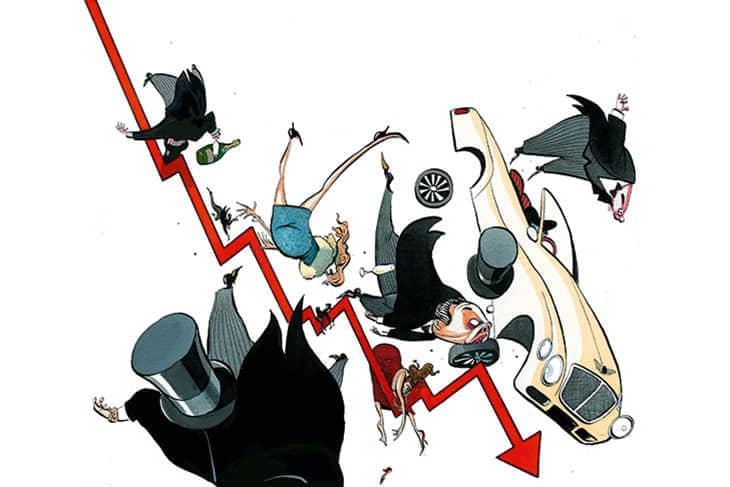Don’t blame the banks?
Sir: Kate Andrews struggles to disentangle the causes of the developing cost-of-living crisis (‘Cold truth’, 19 March), with the fallout from Brexit, Covid and Putin’s invasion of Ukraine all vying for responsibility. She forgets the financial crash of 2008, when a few irresponsible banks and building societies dragged this country into a financial abyss. The jury is still out on the effect that the Bank of England’s remedy of quantitative easing has since had on inflation and wealth inequality.
We are all still paying the price for this disaster, as will be the next couple of generations. After 2008, successive governments paid for the bailout of the banks by pulling the plug on the central funding of local authorities which, contrary to popular belief, only ever got barely half of their income from council taxes. It was this that led to the hollowing out of city, county and town halls throughout the UK.
Now, despite ever-increasing rates bills, communities that once had public libraries, swimming pools and playing fields now have filthy streets, potholed roads and, if you’re lucky, fortnightly refuse collection.
Christopher Goulding
Newcastle upon Tyne
Wind up
Sir: Barometer (12 March) states that Britain got 40 per cent of its ‘energy’ from the wind last month. In fact, it got 40 per cent of its electricity from wind. Because electricity is only a quarter of our total energy consumption it therefore means wind only generated 10 per cent of our energy, not 40 per cent. This is important because it potentially misleads people into thinking that wind power is a greater source of energy than it actually is. Likewise, it might discourage people from believing in fracking, because if wind is seen to generate more ‘energy’ than gas (22 per cent in the statistic), people might question why we need any additional gas supply.
The gas that heats our homes is about a third of our total energy consumption and there is no readily available substitute for that. It is five to six times more gas than is used in gas-fired electricity generation.
Matthew Leese
Sheffield
Problems big and small
Sir: Nicola Shulman’s fascinating article on Philip Larkin (‘This be the curse’, 12 March) reminded me of the scene in Wyndham Lewis’s The Apes of God in which Matthew Plunkett (Lytton Strachey) is told by Dr Frumpfsusan: ‘Small nose, small feet, and small pudenda – that is a fatal combination! A virulent scale-complex of psychical inferiority is inevitable.’ I didn’t know it could happen in reverse.
Richard George
St Albans, Herts
Disinheriting Durham
Sir: In common with many Durham alumni, I share Nathan Risser’s concerns about its direction and reputation (‘Durham’s downfall’, 19 March). It is dispiriting to see the university’s name pulled regularly through the mud, especially when it seems to be the university doing most of the pulling. When I wrote to the new vice-chancellor in December to express my concern that Durham was abandoning debate and free speech in favour of the ethos of the kindergarten, the reply I received was both dismissive and irrelevant. Reluctantly I have removed Durham from my will, and perhaps others will do the same until the university stops embarrassing us.
Jonathan Birt
London N5
A vibrant university
Sir: Allow me to present an alternative view of Durham University: of an inspiring, challenging, innovative, responsible and enabling place, where extraordinary things are achieved (‘Durham’s downfall’, 19 March). Last year Durham was the only UK university to rise in the QS World University Rankings, Times Higher Education Global Impact Rankings and Complete University Guide.
We are diverse and global, comprising 120 countries and with scholarships to support local, state school and black heritage applicants. Our intake now defines itself as 67.6 per cent white compared with 79.9 per cent in 2010. However, greater diversity would be very welcome. As an academic and college principal I am aware that this enriches our community, and helps develop graduates equipped to work, interact, negotiate and serve in a world that needs people who are open to it.
Our campus is vibrant: we have been teaching face-to-face almost all term and we resumed student enrichment activities earlier than many. Running a college during Covid has been hard, but students have been resilient and creative.
We are committed to freedom of speech within the law and encourage reflection through the many party-aligned and issue-focused student groups run through Durham Students’ Union. I take a strong view that we reject behaviours that breach respectful decency, wherever they are expressed. If Durham faces a challenge, it is not with resisting new ideas but figuring out how to embrace them, benefiting from the richness and energy they bring. I invite Mr Risser to visit his alma mater, and challenge him to let his opinion be changed.
Professor Simon Forrest
Professor of sociology and principal of
the College of St Hild and St Bede
Durham University
The joy of tripe
Sir: I contend that Gus Carter’s excellent piece on offal (‘Vital organs’, 12 March) missed one vital organ: tripe. Tripe and onions have been on the menu for years: small pieces of thick seam tripe and coarse-cut onions are stewed in milk seasoned with sage or bay leaves. Tripe is really the stomach of any ruminant. Most common is cow stomach, but sheep, deer, antelope and even giraffe stomachs are good too. I will always choose tripe if it’s on a restaurant’s menu. I remember it was served as the main course in the Harare Club every Tuesday.
Donald King
Kennerleigh, nr Crediton, Devon






Comments